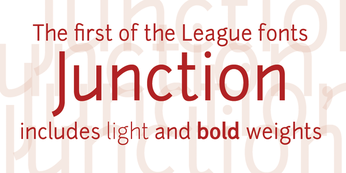The League of Moveable Type
Just Your Type
The Free Font Movement is transforming free software, one character at a time.
Fonts were a late concern on the free desktop. As late as 2004, free fonts were almost non-existent, and the few that existed were of low quality. Yet a decade later, hundreds of free-license fonts are available on sites like Google Fonts [1] and the Open Font Library [2]. However, no site is known for quality more than The League of Moveable Type [3], a site dedicated to promoting free fonts and educating users about typography.
Billing itself as "the first free font foundry," The League of Moveable Type was founded in 2009 by Micah Rich as a spinoff from the A Good Company [4] design studio. Rich's education was in motion graphics and graphic design, so he describes his education in typography as "pretty practical and traditional." However, he adds, "I was interested in the web, too, and ended up using my senior thesis to teach myself more than just web design. I got into Ruby and Rails and a handful of other tools, and the community in those things are so open and sharing. My programming background has really influenced how I think about things."
[...]
Buy this article as PDF
(incl. VAT)
Buy Linux Magazine
Subscribe to our Linux Newsletters
Find Linux and Open Source Jobs
Subscribe to our ADMIN Newsletters
Support Our Work
Linux Magazine content is made possible with support from readers like you. Please consider contributing when you’ve found an article to be beneficial.

News
-
Chaos Comes to KDE in KaOS
KaOS devs are making a major change to the distribution, and it all comes down to one system.
-
New Linux Botnet Discovered
The SSHStalker botnet uses IRC C2 to control systems via legacy Linux kernel exploits.
-
The Next Linux Kernel Turns 7.0
Linus Torvalds has announced that after Linux kernel 6.19, we'll finally reach the 7.0 iteration stage.
-
Linux From Scratch Drops SysVinit Support
LFS will no longer support SysVinit.
-
LibreOffice 26.2 Now Available
With new features, improvements, and bug fixes, LibreOffice 26.2 delivers a modern, polished office suite without compromise.
-
Linux Kernel Project Releases Project Continuity Document
What happens to Linux when there's no Linus? It's a question many of us have asked over the years, and it seems it's also on the minds of the Linux kernel project.
-
Mecha Systems Introduces Linux Handheld
Mecha Systems has revealed its Mecha Comet, a new handheld computer powered by – you guessed it – Linux.
-
MX Linux 25.1 Features Dual Init System ISO
The latest release of MX Linux caters to lovers of two different init systems and even offers instructions on how to transition.
-
Photoshop on Linux?
A developer has patched Wine so that it'll run specific versions of Photoshop that depend on Adobe Creative Cloud.
-
Linux Mint 22.3 Now Available with New Tools
Linux Mint 22.3 has been released with a pair of new tools for system admins and some pretty cool new features.

